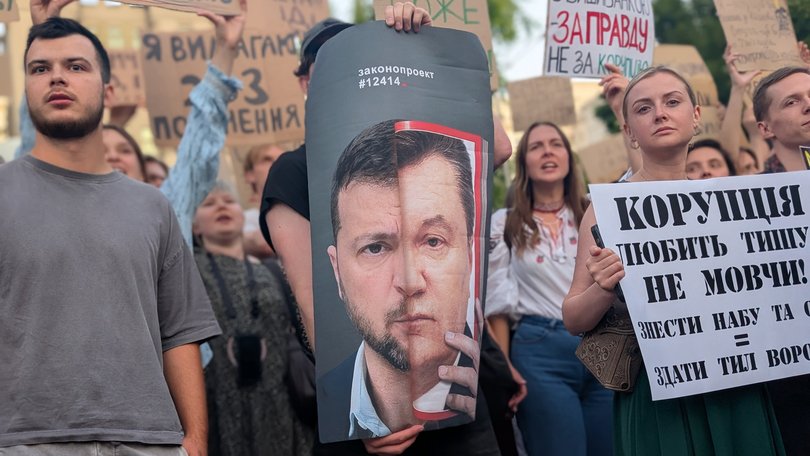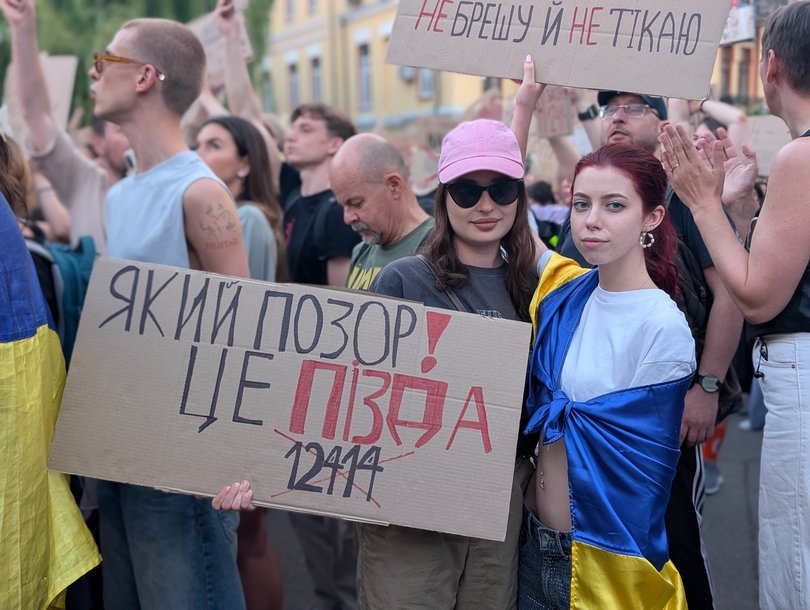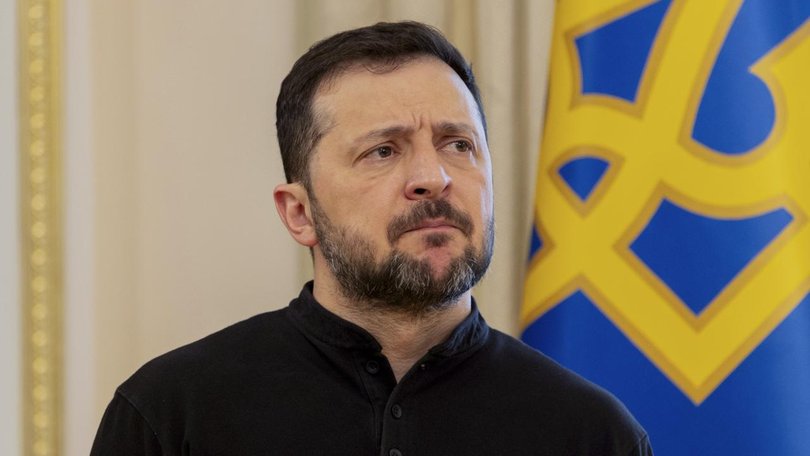LATIKA M BOURKE: Zelensky’s assault on anti-corruption bodies is a major setback for Ukraine’s EU bid
LATIKA M BOURKE: Volodymyr Zelensky’s assault on anti-corruption bodies is a major setback for Ukraine’s already difficult journey to the European Union.

Volodymyr Zelensky has put his people in a terrible position with his shock and rash decision to drive a stake through the independence of Ukraine’s anti-corruption bodies.
He signed into law on Tuesday night a bill that placed under political control the country’s two anti-corruption bodies, the National Anti-Corruption Bureau (NABU) and Specialised Anti-Corruption Prosecutor’s Office (SAPO).
The bill was passed with no debate, and MPs were given around 15 minutes’ warning before it was rammed through Ukraine’s parliament, Verkhovna Rada.
Sign up to The Nightly's newsletters.
Get the first look at the digital newspaper, curated daily stories and breaking headlines delivered to your inbox.
By continuing you agree to our Terms and Privacy Policy.NABU and SAPO were established after the 2014 Revolution of Dignity that led to the downfall of the former pro-Russian president Viktor Yanukovych, who now lives in exile in Russia.
Zelensky’s former foreign minister Dmytro Kuleba described it as a “bad day for Ukraine.”
“I understand that for many in power, the Dignity Revolution is just an annual social media post,” he said on Instagram.
“But for millions of people, it was a sacrifice for justice.
“Now the President has a choice - to stand on the side of the people or not to.”
The move exposed to the world the contrast between how Zelensky, the global West’s modern-day Winston Churchill, is seen at home and on the international stage.
In Ukraine, Zelensky is seen as distant from the people. As one Ukrainian put it to me: “He is seen as standing for Ukraine but not as standing for Ukrainians.”
Zelensky’s powerful chief of staff, Andriy Yermak, is distrusted as a power-grabber, and the pair have little to no opposition or accountability because of martial law.
But in Ukraine there has been reluctance to criticise the President too loudly, because his success on the global stage, including recently smoothing over the relationship with US President Donald Trump, is literally the difference between life and death for Ukrainians who are fighting on the frontline and lack the type and amount of Western weapons they need to make any meaningful advances in their war of attrition against Russia.
Ukrainians also do not want to allow Russia to exploit democratic dissent to try and divide the West and Ukrainian society.
But all this changed this week when Zelensky sought to denude NABU and SAPO, and the simmering discontent spilt over into the first protests of the war stretching across two days.

“Undermining and destroying anti-corruption infrastructure is the first step to autocracy and tyranny,” opposition MP Yulia Klymenko told me.
“Also, Putin’s main message is that Ukraine is a failed state; they have corruption, don’t give them weapons and money because corruption is very high, according to Putin.
“So destroying the anti-corruption infrastructure will prove Putin’s narrative, and we will help Putin to prevail in propaganda and in the minds of the international community, which is very dangerous.”
Expressing the sentiment of those on the frontline was one veteran protestor, sitting in a wheelchair in the front row of Wednesday night’s protests, holding a sign that said: “We are fighting for Ukraine, not your impunity.”
Zelensky’s actions were a kick in the teeth for Ukrainians, particularly the younger generation whose parents and grandparents took part in these protests on their children’s behalf.
More than a hundred people paid with their lives for those advances because Ukrainians see a future for their country that is antithetical to the one that Russia’s Vladimir Putin is trying to impose on them through missiles, drones and terror.
‘I want to live in a European Ukraine, not in a Ukraine like Russia. I want freedom,’ Vlada, a 20-year-old student, told me as she held up a cardboard sign at the protests on Wednesday, held in the closest public space to Zelensky’s office.
Go anywhere in Ukraine and the European Union’s circle of stars hangs proudly beside Ukraine’s yellow and blue flag. It is displayed in official government offices, hotels and parliamentary buildings.
European nations are divided about when Ukraine might be admitted to the Union. While European Commission President Ursula von der Leyen says entry is possible before 2030, Germany’s Chancellor Friedrich Merz recently cast doubt on Ukraine being admitted before 2034.
Zelensky’s assault on the anti-corruption bodies is a major setback for that already difficult journey, as was swiftly, and publicly, conveyed to Kyiv by an array of European leaders.

Marta Kos, the European Commissioner in charge of future entries to the Union, said NABU and SAPO were “essential for Ukraine’s EU path.”
Ambassadors from G7 nations in Kyiv said in a joint statement they had “serious concerns.” Czechia’s Foreign Minister Jan Lipavský said he had reminded his Ukrainian counterpart that their support was not a “blank cheque.”
Zelensky’s transformation on NABU constitutes a significant departure from the messages he put out in the early months of his presidency, urging citizens to report suspected corruption to the NABU hotline.
“We will never overcome corruption if you keep turning a blind eye to it,” he said in a video message in September 2019, four months after being elected president.
Younger Ukrainians who may have been inspired by that very message turned out in their thousands across the country to protest.
‘Veto the law,’ they chanted. They sang hymns and chants of Glory to Ukraine, and that the people are the true power.
The most notable thing about the protest was that there was no main attraction, no central figure of dissent, no ringleader as such. There was no stage, no speeches and most signs were written on the spot on hastily acquired small pieces of cardboard.
Only a handful of signs, including one that devastatingly morphed Zelensky’s image into Yanukovych’s, were professionally printed.
Highly educated, super intelligent and extremely articulate in a second language, the protestors I spoke to told me of their dismay in Zelensky.
All said they felt it was their duty to continue the legacy of their parents and grandparents in fighting for their freedoms and a life governed by law, not cronyism.
This was an organic gathering of mostly students, most of whom weren’t even old enough to have voted for Zelensky before the war.
“That’s kind of a Ukrainian thing, actually,” 19-year-old Andrii Korotkyi told me.
“Every single revolution in Ukraine started with students from universities. It’s our national code.
“After the full-scale invasion, I went to Slovenia, and now I come back.
“I want to live in this country because it’s my country, because it’s my homeland.
“And I want it to be as good as possible.”
It is disturbingly easy to forget there is a war as you move around Kyiv. The city is vibrant and bustling, and its youth are cool and trendy.
But the city has been consistently targeted by drone and missile attacks in recent weeks, making the bravery of the young Ukrainians protesting all the more stark.
I asked several young girls if they weren’t afraid of being bombed, with the public gathering, making them a potential prime target for Moscow.
“Yes, very scared actually,” 20-year-old Vlada told me. “But I can’t do nothing.”
Another 19-year-old girl told me: “This is higher than anything.”
Their bravery is breathtaking and possibly already yielding results.
As the demonstrations took place, Zelensky used his nightly video address to promise a rewrite of the laws.
Citing the need to remove Russian interference, he said he would put a bill to the parliament, which is now in recess.
“Of course, everyone has heard what people are saying these days – what they are saying on social media, to each other, on the streets. It’s not falling on deaf ears,” Zelensky said.
His promise is vague and not yet firm enough to appease Ukraine’s powerful dissenters.
But it is a start and a sign that no matter how many MAGA enthusiasts exploit Zelensky’s serious misstep, the people of Ukraine will do all they can to prevent what Yulia Klymenko, a sitting MP in a rival party to Zelensky’s Servant to the People, told me, was a “first step to autocracy and tyranny.”
There was no violence, no disruption and protestors were leaving from 10 pm to be home in time for the midnight, wartime curfew.
It was a dignified show of resistance that served as a powerful reminder that Ukrainians are fighting for their freedoms in more ways than one.
And yet another example of how much there is to learn from this society, that goes far beyond merely copying how to build killer drones.

